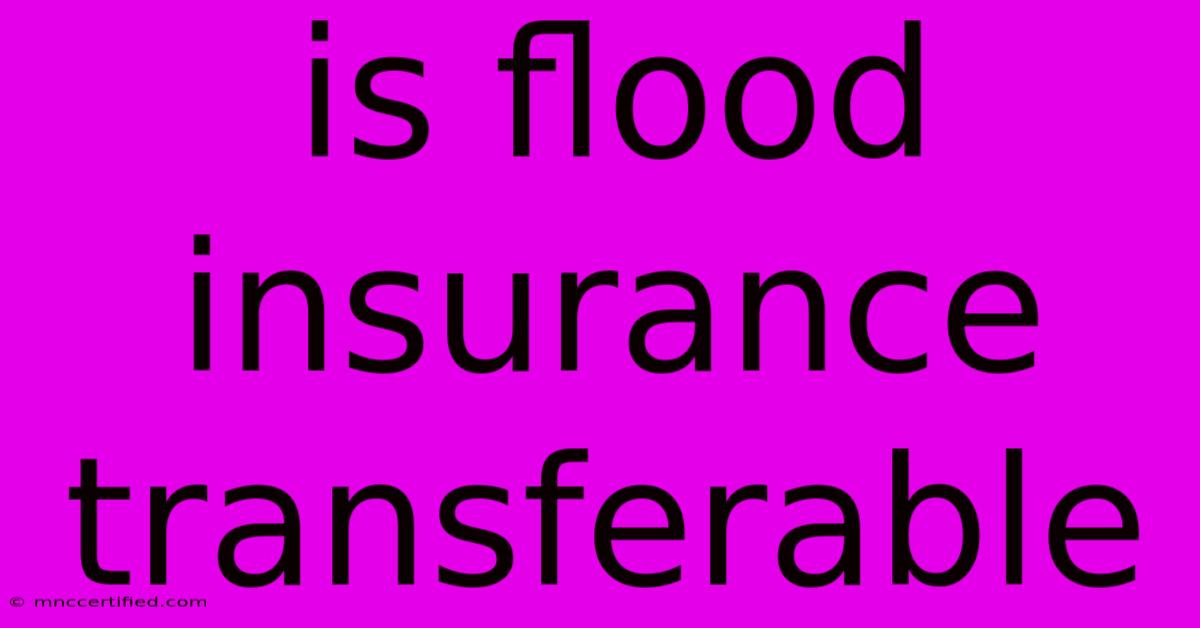Is Flood Insurance Transferable

Table of Contents
Is Flood Insurance Transferable? A Comprehensive Guide
Flooding is a devastating natural disaster, causing billions of dollars in damage annually. Protecting your property with flood insurance is crucial, but what happens if you sell your home? A common question arises: is flood insurance transferable? The short answer is: it depends. While the policy itself isn't directly transferable, the flood insurance coverage can be transferred to a new homeowner under certain circumstances. This article will delve into the intricacies of transferring flood insurance, clarifying the process and highlighting important considerations.
Understanding Flood Insurance Policies
Before exploring transferability, understanding the nature of flood insurance is vital. Flood insurance policies are typically provided through the National Flood Insurance Program (NFIP) or private insurers. These policies are tied to the property, not the policyholder. This fundamental point is key to understanding the transfer process. The policy covers the building and its contents against flood damage at a specific address.
Can I Transfer My Flood Insurance Policy?
No, you cannot directly transfer your existing flood insurance policy to a new homeowner. Your policy is linked to your name as the policyholder and expires upon the sale of the property. Thinking of it like car insurance, you can’t simply give your car insurance policy to the buyer of your car. Instead, a new policy must be initiated.
How to Ensure Flood Insurance Coverage for the New Homeowner
The good news is that the flood insurance coverage can be continued, but it requires action from both the seller and the buyer. Here’s the process:
1. Pre-Sale Preparations:
- Notify your insurer: Inform your flood insurance provider of your impending sale well in advance. This allows ample time for processing the necessary paperwork.
- Obtain an elevation certificate: If you have one, this document is crucial for determining flood risk and premium calculations. Providing this to the buyer expedites the process.
- Review your policy details: Understand your coverage limits, deductibles, and policy expiration date. This information is vital for informing the buyer.
2. The Transfer Process:
- Buyer's responsibility: The buyer is responsible for applying for a new flood insurance policy with the same insurer or a different provider. They will need to provide information about the property and themselves.
- Seller's assistance: While not obligated, the seller can significantly aid the buyer by providing the elevation certificate and policy details. This smooths the transition.
- Insurance company's role: The insurance company will review the buyer's application, assess the property's risk, and issue a new policy. The premium may change depending on factors like the buyer's credit score and any changes to the property's flood risk.
3. Timing is Crucial:
- Gap in Coverage: It's crucial to avoid a gap in coverage. The buyer should start the application process well before closing to ensure seamless transition. Ideally, the new policy should be in effect before the sale is finalized.
- Coordination with Closing: Coordinate with the real estate agents, lender, and insurance company to ensure that the flood insurance transfer aligns with the closing date.
Factors Affecting the Transfer Process
Several factors can influence the ease of transferring flood insurance coverage:
- Property location: High-risk flood zones might result in higher premiums and a more rigorous application process for the new buyer.
- Insurance company policies: Each insurance company has its own procedures and requirements. Some might be more streamlined than others.
- Property changes: Any significant modifications made to the property since the original policy was issued may affect the new policy's terms.
Why Seamless Transfer Matters
A smooth transfer of flood insurance coverage protects both the seller and the buyer. It safeguards the buyer from potential financial losses due to flood damage and avoids any complications during the real estate transaction. For the seller, it ensures a less stressful closing process.
Frequently Asked Questions (FAQs)
- Q: Can I transfer my flood insurance to another property? A: No, flood insurance policies are property-specific, not transferable to different addresses.
- Q: What if the buyer doesn't want flood insurance? A: The buyer can choose not to purchase flood insurance, but this leaves them financially vulnerable in case of a flood.
- Q: Does the transfer affect my credit score? A: The transfer itself does not directly affect your credit score. However, the buyer's credit score can influence their new policy's premium.
By understanding the nuances of flood insurance transferability and following the steps outlined above, both sellers and buyers can ensure a smooth and secure transition of flood protection, minimizing potential risks and complications during the property sale. Remember, proactive communication with your insurance provider and careful coordination throughout the process are key to success.

Thank you for visiting our website wich cover about Is Flood Insurance Transferable. We hope the information provided has been useful to you. Feel free to contact us if you have any questions or need further assistance. See you next time and dont miss to bookmark.
Featured Posts
-
Trumps 2020 Election Suit Dismissed
Nov 26, 2024
-
Mc Kay Investment Co Llc Eugene
Nov 26, 2024
-
Resentencing Menendez Brothers Case
Nov 26, 2024
-
Ladbroke Grove Double Shooting Updates
Nov 26, 2024
-
Lana Del Reys Glasgow Stadium Concert
Nov 26, 2024